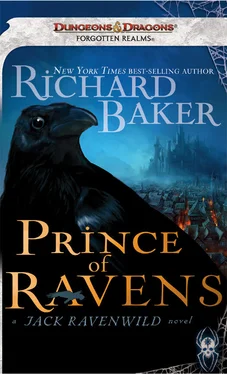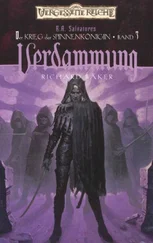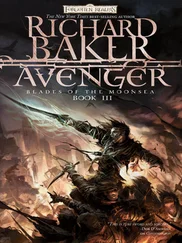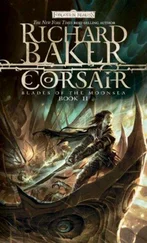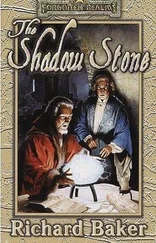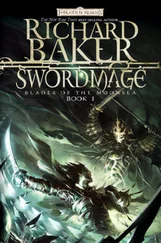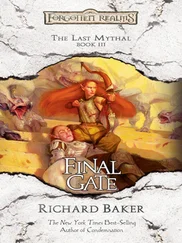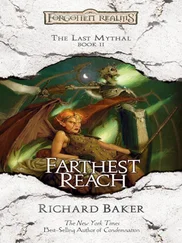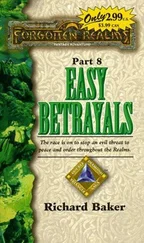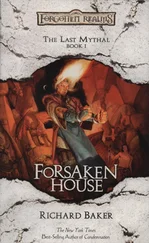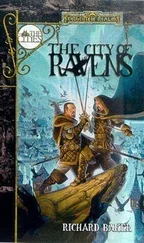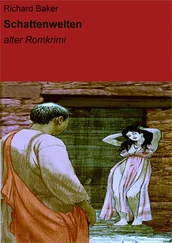Richard Baker - Prince of Ravens
Здесь есть возможность читать онлайн «Richard Baker - Prince of Ravens» весь текст электронной книги совершенно бесплатно (целиком полную версию без сокращений). В некоторых случаях можно слушать аудио, скачать через торрент в формате fb2 и присутствует краткое содержание. Жанр: Фэнтези, на английском языке. Описание произведения, (предисловие) а так же отзывы посетителей доступны на портале библиотеки ЛибКат.
- Название:Prince of Ravens
- Автор:
- Жанр:
- Год:неизвестен
- ISBN:нет данных
- Рейтинг книги:4 / 5. Голосов: 1
-
Избранное:Добавить в избранное
- Отзывы:
-
Ваша оценка:
- 80
- 1
- 2
- 3
- 4
- 5
Prince of Ravens: краткое содержание, описание и аннотация
Предлагаем к чтению аннотацию, описание, краткое содержание или предисловие (зависит от того, что написал сам автор книги «Prince of Ravens»). Если вы не нашли необходимую информацию о книге — напишите в комментариях, мы постараемся отыскать её.
Prince of Ravens — читать онлайн бесплатно полную книгу (весь текст) целиком
Ниже представлен текст книги, разбитый по страницам. Система сохранения места последней прочитанной страницы, позволяет с удобством читать онлайн бесплатно книгу «Prince of Ravens», без необходимости каждый раз заново искать на чём Вы остановились. Поставьте закладку, и сможете в любой момент перейти на страницу, на которой закончили чтение.
Интервал:
Закладка:
They halted before a crude bunkhouse or shelter of stone, mud, and moss. “Malmor!” the guard who’d struck Jack called. “We’ve got a new dung-shoveler for you, Malmor.”
There was a thick, snuffling grunt, and then a huge, shaggy figure appeared in the shelter’s doorway. Its yellowed skin was covered in lank, reddish hair, and a vast belly sagged over its ill-fitting leather breaches. The creature-a bugbear, Jack thought, although he’d never seen one so fat-bobbed his head and grinned crookedly at the drow guards. “Good, good, masters. I have much work, much work. But I do not like the looks of this one, no, no. Too small, too small, too thin, I think. He seems a shirker to me, a shirker he seems.”
“That is hardly our concern now,” the second drow guard said.
The bugbear Malmor approached and poked Jack with one fat finger. “I will have to keep an eye on him all the time, all the time. Easier to kill him now.”
“If Matron Dresimil wanted him dead, she would have killed him herself,” the guard Varys replied. “If you have dung in need of shoveling, have him do it. Otherwise, work him as you see fit, but do not kill him.”
The bugbear flicked a spiteful look at Jack, but bowed and simpered to the dark elves. “Dung I have in plenty, masters, in plenty. It shall be as you say.”
“Good,” the dark elves said. They threw Jack to the ground at the bugbear’s feet, and marched away back to the castle.
Jack picked himself up and started to brush himself off, only to discover that he’d already encountered his first rothe patty. He grimaced in disgust, but Malmor only laughed. “Don’t trouble yourself, no, no,” the bugbear said. “By the end of the day you’ll wear it from head to toe no matter what you do. Now follow me if you want a shovel.”
Jack sighed, and followed the bugbear.
CHAPTER TWO
How long Jack Remained in the Rothe paddocks he couldn’t begin to guess. In the sunless gloom of the Underdark, there was no dawn to mark the start of a day or sunset to end one. Time simply passed in dull, shapeless hours of toil. Malmor worked him to exhaustion; he would collapse in some stinking corner of the mushroom-cluttered fields, sleeping fitfully until discovered and kicked awake. At long intervals, surely a full day of the surface world, other slaves were sent to the kitchens beneath the brooding drow tower to bring back pails of bland gray porridge to the paddocks. And then it was back to the never-ending work of tending the dark elves’ herds.
Jack soon learned to loathe the rothe, the dark elves’ cattle. They were shaggy, stinking subterranean musk-oxen that devoured huge amounts of fungi Jack never would have imagined to be edible by anything, and soon enough turned that fungi into equally huge amounts of foul droppings. The creatures were not as large as surface cattle, standing little higher than Jack’s breastbone, but they were solidly built; well-armed with sharp horns; and very, very strong. Worse yet, they were far less stupid than they appeared, and possessed an aggressive, sullen temperament. The first time his meager meal of porridge was brought to him in the fields, two of the creatures ran him off from his pail while a third, clearly the ringleader, knocked it over and lapped up Jack’s lunch.
Naturally, he bent his every effort to absenting himself from the situation as quickly as possible. Unfortunately the drow and their trustees were well aware that he might not voluntarily remain in their service, and supervised him with maddening thoroughness. Whenever Malmor wasn’t in sight, one of the lesser overseers working for him kept an eye on Jack: Two-Tusks the orc, a rabid gnoll called Karshk, the hateful dwarf Craven, or one of the other boss-slaves who watched over the captives working in the paddocks. Jack discovered that Malmor and his thugs had an uncanny gift for anticipating him; whenever slaves were sent to work in distant enclosures of the rothe paddocks where a captive might be tempted to make a run for it, the overseers never failed to pull Jack out of the work party for duties close at hand. When field-slaves were sent to the castle to draw pails of porridge, Jack always seemed to be the last one to learn that food was available and consequently drew the meagerest portion. Soon enough Jack’s limbs trembled from weakness, and the aromas of dripping roasts and potato-filled stews came to haunt his dreams.
Jack had always imagined that a long period of forced servitude might offer a clever-witted and resolute fellow such as himself the opportunity to rise to his circumstances. His enemies might believe they had broken him, but still the fires of vengeance would smolder in his heart. In the most wretched of circumstances he would naturally find the keys to his eventual freedom: discarded tools that could be cunningly hoarded to improvise weapons or disguises, the slow establishment of camaraderie and trust with fellow-prisoners who could help him on his way, the inevitable appearance of patterns in the guards’ activities that he could exploit in a cunning plan. In the bards’ stories such things always came to wronged prisoners who persevered in their toil … but not to Jack. He was beaten severely whenever he touched anything that wasn’t a shovel. His fellow-prisoners (a motley assortment of orcs, wretched human or dwarf slaves, goblin rabble, and worse) hated him and clearly intended to murder him as soon as Malmor and the other overseers weren’t watching. And hunger and toil soon dulled his wits into something about as useful as the miserable gray slop he had to fight for at each meal.
Magic, of course, would have helped him to escape easily. But the Weave remained dull and distant, so much so that Jack began to fear that it was somehow completely absent in the dark elves’ domain, or that his long imprisonment had completely numbed his ability to perceive it. Whenever the overseers weren’t watching (which wasn’t often) he tried every spell he knew, with the same result-he waved his hands, he babbled some nonsense, and nothing happened. And, naturally, if any overseer caught him skulking off to do nothing, a beating followed immediately.
In the rare moments when Jack discovered enough energy to take note of his situation, all he could manage was a sort of confused indignation. Someone was the author of his misfortunes, but he had no idea who, because he couldn’t remember a thing about how he’d come to be entombed in the mythal stone. “A man can be measured by the quality of his enemies,” he told himself, “and clearly I had many formidable adversaries.” He knew, for example, that the ever-prying, ever-suspicious Knights of the Hawk blamed him for a number of thefts and escapades in the noble quarters of Raven’s Bluff. Jack didn’t see why they should trouble themselves about such things when he went to great lengths to spread his depredations around a large number of wealthy folk, none of whom were greatly injured by any one burglary on his part; his attentions were certainly no more onerous than ordinary taxation, and they didn’t set the Knights of the Hawk on tax collectors, did they? That, of course, suggested the possibility that one of the city’s thief guilds had arranged for his abduction to remove him as a rival, but that, too, seemed unlikely. Guilds were highly imaginative in their methods for dealing with freelancers such as Jack, but entombing him in a magical rock a mile below the surface seemed overly … subtle.
“Subtlety is the hallmark of a wizard,” Jack mused aloud when next he resumed his deliberations. The fact that he was magically encysted rather than simply bricked up in an alcove was clearly a sign of arcane talent. Therefore, it seemed likely that his unknown adversary was a wizard of some sort. Three potential culprits sprang immediately to mind: Zandria, the Red Wizard who had often threatened Jack for meddling in her affairs; the mysterious Yu Wei, the wizened old Shou who served the Warlord Myrkyssa Jelan; and the dreadful necromancer, Iphegor the Black, who so far as Jack knew consented to serve no one. If Jack were to be honest with himself, all three had good reason to act against him. Jack had been the principal actor in the defeat of Myrkyssa Jelan’s plot to infiltrate Raven’s Bluff, frustrating the master plan of Yu Wei’s liege-lady. He’d raced Zandria to the prize of the Guilder’s Vault in ancient Sarbreen, capturing the most valuable treasures before she recovered them. And it was unfortunately true that Jack might have had some small part to play in the untimely death of Iphegor’s dearly beloved familiar, which had taken the form of a rather small and frail mouse. The necromancer’s failure to provide himself with a sturdier companion was hardly Jack’s fault, but Iphegor might have seen things otherwise.
Читать дальшеИнтервал:
Закладка:
Похожие книги на «Prince of Ravens»
Представляем Вашему вниманию похожие книги на «Prince of Ravens» списком для выбора. Мы отобрали схожую по названию и смыслу литературу в надежде предоставить читателям больше вариантов отыскать новые, интересные, ещё непрочитанные произведения.
Обсуждение, отзывы о книге «Prince of Ravens» и просто собственные мнения читателей. Оставьте ваши комментарии, напишите, что Вы думаете о произведении, его смысле или главных героях. Укажите что конкретно понравилось, а что нет, и почему Вы так считаете.
